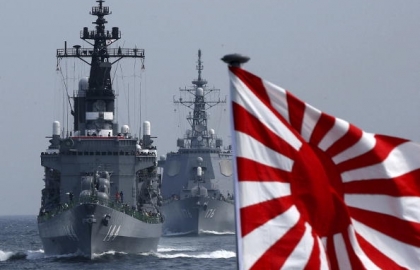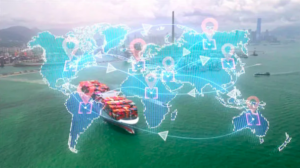The South China Sea (SCS) is among the most hotly disputed regions of the globe, involving both island and maritime claims among several sovereign states within the region. Given its geopolitical location, Brunei, the People’s Republic of China (PRC), the Republic of China (ROC/Taiwan), Indonesia, Malaysia, the Philippines, Vietnam, and Japan have a claim to the oil and natural gas drillings taking place in the region. The region is highly contested also because the South China Sea (SCS) is a prominent shipping passage with $5.3 trillion worth of trade cruising through its waters every year, nearly one-third of all global maritime trade. Needless to say, these factors make the South China Sea a source of tension and economic wealth, further aggravating conflicts between Japan and the PRC and putting Japan’s economy in jeopardy.
The US security umbrella vs. China’s ambitions
The part the United States plays in the South China Sea disputes is also crucial since providing a security umbrella to Japan and Taiwan, Washington toughens its stance against Beijing proposing China’s claims to the South China Sea are “unlawful.” Therefore, the US-China rivalry topped with Japan’s siding with Vietnam creates further tension between Japan and the PRC, increasing the gap between the two countries and deteriorating trade relations. Moreover, as the Chinese People’s Liberation Army (PLA) modernizes its arsenal and Beijing keeps stepping up its military activities in the region, the Washington-Tokyo alliance criticizes China for its “unlawful” and aggressive step-up in its Exlusive Economic Zone (EEZ).
China has long favored and deserved—in its perspective—the dominance and sovereignty over the South China Sea. The Communist Party of China (CPC) has become even bolder following the Covid-19 pandemic, seizing every opportunity to assert its newfound might and economic ambitions. In late July, for instance, the Chinese military began live-fire drills in the South China Sea in a challenge to US freedom of navigation operations there. The geopolitical conflicts in the South China Sea have grown to be much hotter after these drills, where both the US and its regional partners such as Vietnam will react to counterbalance what they see as a threatening shift in regional power.
Where does Japan fall in this context?
As China keeps stepping up its claims to the SCS based on its Nine-Dash Line policy and through political, economic, military, and legal means, making the region a future site of potential conflict, Japan has become more involved in the regional disputes regarding the SCS in terms of its economy and energy security. Japan’s role in the region is crucial, given the country’s increasing trade partnership with ASEAN. Intending to bypass China’s investments in ASEAN countries, Japan harbors considerable political, economic, and strategic interests in Southeast Asia as one of the top world trading nations with the Southeast Asian countries. Moreover, given the Article 9 of the Constitution of Japan, Japan has been the security alliance partner of the US, China’s most influential rival shielding other claimant nations in the region. Last but not least, the SCS is not the only region where geopolitical conflicts escalate. The East China Sea (ECS) has also been a source of territorial as well as Exclusive Economic Zone (EEZ) border disputes between Japan and China. In all senses, from a political perspective, Japan’s interests in the South China Sea are increasing, and the country has become one of the inevitable political actors in the region.
Japan’s energy security
On top of that, when considering the current energy security topped with the geopolitical conflicts in the Asia-Pacific, Japan appears increasingly desperate to secure its energy resources. Although Iran’s crude oil has become more affordable under US sanctions, Japan cannot get involved in any kind of trade agreement with the country. In other words, under the US security umbrella, Japan would jeopardize its relations and alliance with the US should it get involved in any kind of trade relation with Iran to supply its energy deficit. Therefore, Japan’s increasing investments in hybrid cars do not come as a surprise, while it also allocates more budget and energy to participate in the oil and natural gas drilling activities in the South China Sea, blocked by China’s aggressive military actions within the region. Consequently, Japan’s current energy deficit results in a continued need to search for alternative energy resources such as natural gas and oil, and from diversified origins such as the South China Sea.
Because China enjoys a more advantageous situation under the current security situation, there is no doubt that the countries having a claim to the drillings in the region want to see a more perseverent US. Therefore, described as “small but growing,” the economic powers of Southeast Asia have become the signatories of different alliances as a counter to the PLA’s challenges in the SCS. On July 28, Japan signed a ¥36.6 billion ($345 million) loan agreement with Vietnam. With the signing of the deal between the Japan International Cooperation Agency (JICA) and the Vietnamese government in Hanoi, Japan endeavors to provide the Southeast Asian country—also China’s most prominent rival among ASEAN nations—with six patrol boats to boost its maritime law enforcement capabilities. Japan’s agreement with Vietnam acts as a counterbalance against the China-Malaysia standoff that has been going on for months. As Malaysia’s state-owned Petronas kept drilling two oil and gas fields while the Chinese government vessel Haiyang Dizhi 8 pursued “exploration” navigations in the SCS, the Japan-Vietnam agreement goes far beyond mere economic cooperation. Japan, by siding with Vietnam—also backed by the US in its maritime investigations and stance against China—wants to have a stronger claim to the SCS. The SCS is an unavoidable energy source for Japan since it is, as mentioned, shifting its energy security towards hybrid technology, renewable energy resources, and natural gas and oil in the SCS to diversify from costly oil from the Middle East.
Fisheries
The complicated nature of the South China Sea disputes also include Japan’s fisheries industry. According to recent data, around 12 percent of the global fish catch comes from the South China Sea, which also hosts more than half of the world’s fishing vessels. Therefore, fishery stocks in the South China Sea are necessary to satisfy both global and Japan’s domestic food demand. While fisheries traditionally play an important role in food security and traditional cuisine in Japan, both domestic and overseas fishing industries are an indispensable source of economic wealth for Japan. The country’s exports of fish and fishery products were valued at USD 2 billion in 2017. Domestic production supported about 68 percent of national fish consumption. In 2016, fish consumption was estimated at 45.3 kg per capita. Wıth surging geopolitical disputes and illegal overfishing taking place in the SCS, a looming fisheries crisis forces Japan to establish alliances (such as the inking of Vietnam agreement) and raise its voice in the geopolitical arena of the SCS. Therefore, the SCS is vital to Japan’s economic security not only in terms of its energy supply but also food security both for the domestic and international markets.
In the face of the Covid-19 pandemic, with closure of international borders implemented by the Government of Japan, unprecedented disruption to the global economy and world trade, and Japan’s slowing tourism industry, Japan must give more importance and allocate more budget to its domestic resources among which its fisheries in the SCS. Therefore, by siding with Vietnam and remaining under the US security umbrella, Japan is striving to boost its dominance in the region by counterattacking China in the political and economic realms.
Conflict resolution and dispute management for a peaceful Asia-Pacific
The geopolitical and regional disputes such as those over the South China Sea are managed through bilateral, trilateral, and regional initiatives as well as Joint Developed Arrangements (JDA). Furthermore, when it comes to geopolitical dispute settlement, regional organizations such as the Association of Southeast Asian Nations (ASEAN) comes into play. The mechanisms available to deal with geopolitical disputes include conflict prevention, avoidance, containment, transformation, settlement, and formal conflict resolution. In this view, dispute settlement appears paramount to deal with current conflicts, which is of ultimate necessity given the economic impacts of the South China Sea disputes on Asia-Pacific countries, among which Japan is a prominent example. The preferred way to solve these issues has so far been multilateral, through organizations such as ASEAN. But China reaffirming its Nine-Dash Line policy has increasingly made this approach impossible, particularly with certain ASEAN member states (Cambodia, in particular) coming under obvious Chinese influence and blocking many ASEAN resolutions on conflict settlement in the South China Sea.
Taking into account all the elements mentioned earlier, it appears obvious that China will not abide by either international law or bilateral agreements. It appears more realistic to see a stronger US presence in the SCS in an effort to tilt the balance of power rather than witnessing China reaching an accord with Japan, Vietnam, the Philippines or any other country with which it has conflicting claims to the South China Sea. As a rising superpower striving to protect its territorial integrity and pushing for a worldwide acceptance of what “China” means, China seems willing to escalate conflict to achieve sovereignty over the South China Sea. Until the US show willingness to go all the way in their re-balancing of forces in the region, China will continue to come into conflict with neighbouring nations over strategically and geographically significant points such as the Taiwan Strait, the Senkaku Islands, and the South China Sea. Therefore, as the race for Prime Minister Shinzo Abe’s succession opens, it is paramount that Japan continues building partnerships with major nations in the Indo-Pacific area (chiefly India and Australia), keep the US as its security umbrella and conserve its alliance with ASEAN to create a stable block against China to preserve its economic interests in the region.
Picture credits: Maritime Issues






Be First to Comment